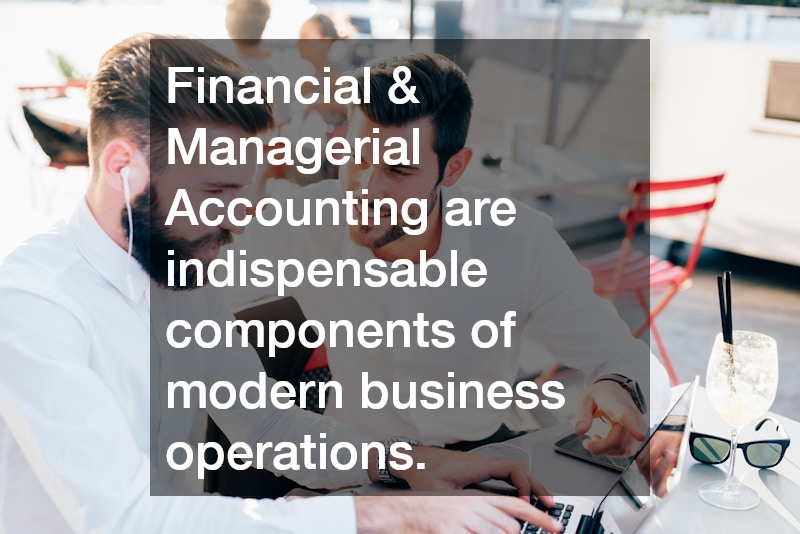
Financial & Managerial Accounting are essential components of any business’s operations, providing the framework for making informed decisions and ensuring long-term success. While these two branches of accounting share common goals, they serve different purposes and audiences. This guide explores their roles, key differences, and how mastering both can benefit your business or career.
Understanding Financial Accounting
Financial accounting focuses on providing accurate and standardized financial information to external stakeholders. These stakeholders often include investors, creditors, regulatory authorities, and the public. The goal is to present a clear picture of a company’s financial health and performance through financial statements.
Key outputs of financial accounting include:
- Income Statements: Showcases a company’s profitability over a specific period.
- Balance Sheets: Highlights the financial position by listing assets, liabilities, and equity.
- Cash Flow Statements: Tracks cash inflows and outflows to measure liquidity.
These reports are prepared in compliance with generally accepted accounting principles (GAAP) or international financial reporting standards (IFRS), ensuring consistency and transparency.
Understanding Managerial Accounting
Managerial accounting, on the other hand, focuses on providing information to internal stakeholders, such as managers and executives, to aid in decision-making. Unlike financial accounting, managerial accounting is not bound by GAAP or IFRS, allowing for greater flexibility in reporting.
Examples of managerial accounting activities include:
- Budgeting and Forecasting: Predicting future revenues and expenses to guide strategic planning.
- Cost Analysis: Determining the costs associated with products, projects, or departments.
- Performance Metrics: Evaluating operational efficiency using key performance indicators (KPIs).
Managerial accounting reports are typically more detailed and tailored to specific organizational needs, making them invaluable for operational and strategic decisions.
Key Differences Between Financial & Managerial Accounting
While both types of accounting are critical to business operations, they differ in several ways:
- Audience: Financial accounting serves external stakeholders, whereas managerial accounting is intended for internal decision-makers.
- Regulations: Financial accounting must adhere to established standards like GAAP or IFRS. Managerial accounting has no such restrictions.
- Focus: Financial accounting emphasizes historical data, while managerial accounting often involves forward-looking analysis.
- Reporting Frequency: Financial accounting typically follows a periodic schedule (quarterly or annually), whereas managerial accounting reports are generated as needed.
These distinctions highlight the complementary nature of financial and managerial accounting, with each playing a unique role in the success of an organization.
The Role of Financial & Managerial Accounting in Business
Both financial and managerial accounting are integral to a company’s financial management. Here’s how they contribute to a business’s success:
- Financial Planning: Managerial accounting helps in setting budgets and financial goals, while financial accounting tracks progress toward those goals.
- Risk Management: Financial statements reveal potential financial risks, while managerial reports provide actionable insights to mitigate them.
- Compliance and Transparency: Financial accounting ensures compliance with legal and regulatory standards, fostering trust with external stakeholders.
- Operational Efficiency: Managerial accounting identifies inefficiencies and helps streamline processes.
By combining insights from both types of accounting, businesses can develop a comprehensive strategy that supports sustainable growth.
Tools and Techniques Used in Financial & Managerial Accounting
Advances in technology have transformed accounting practices, making them more efficient and insightful. Common tools and techniques include:
- Financial Modeling Software: Programs like Microsoft Excel and financial modeling tools enable accurate forecasting and scenario analysis.
- ERP Systems: Enterprise Resource Planning (ERP) systems integrate accounting with other business processes, providing a holistic view of operations.
- Variance Analysis: Compares actual financial performance with budgeted figures to identify discrepancies.
- Break-Even Analysis: Determines the level of sales needed to cover costs, helping businesses set realistic sales targets.
Leveraging these tools allows accountants to provide timely and accurate information that drives better decision-making.
Career Opportunities in Financial & Managerial Accounting
Pursuing a career in financial or managerial accounting can be highly rewarding, offering diverse opportunities across industries. Roles include:
- Financial Accountant: Prepares financial statements and ensures compliance with regulations.
- Management Accountant: Focuses on budgeting, forecasting, and cost management to support internal decisions.
- Auditor: Reviews financial records to ensure accuracy and adherence to standards.
- Controller: Oversees a company’s accounting operations, combining elements of both financial and managerial accounting.
Many professionals choose to obtain certifications like Certified Public Accountant (CPA) or Certified Management Accountant (CMA) to enhance their credentials and career prospects.
Challenges in Financial & Managerial Accounting
While both disciplines are vital, they come with challenges that professionals must address:
- Regulatory Compliance: Adhering to ever-changing financial regulations can be demanding.
- Data Accuracy: Ensuring the accuracy of financial data is critical, as errors can have significant repercussions.
- Integration of Technology: Adopting and mastering new accounting tools can be challenging for some organizations.
- Balancing Short-Term and Long-Term Goals: Managerial accounting requires balancing immediate operational needs with long-term strategic objectives.
By staying informed and leveraging the right tools, professionals can overcome these challenges and deliver value to their organizations.
How to Master Financial & Managerial Accounting
If you’re looking to build expertise in financial and managerial accounting, consider these steps:
- Formal Education: Enroll in accounting or finance programs that cover both disciplines.
- Certifications: Pursue professional certifications like CPA, CMA, or Chartered Financial Analyst (CFA) for specialized knowledge.
- Practical Experience: Gain hands-on experience through internships or entry-level roles in accounting departments.
- Continuous Learning: Stay updated on industry trends, regulatory changes, and emerging technologies.
Mastering these skills not only enhances your career prospects but also empowers you to contribute meaningfully to any organization.
Financial & managerial accounting are indispensable components of modern business operations. While financial accounting focuses on providing transparent and standardized reports for external stakeholders, managerial accounting empowers internal decision-makers with actionable insights. Together, they form the foundation for effective financial management, risk mitigation, and strategic planning. Whether you’re a business leader or an aspiring accounting professional, understanding these disciplines is key to achieving financial success.
.




